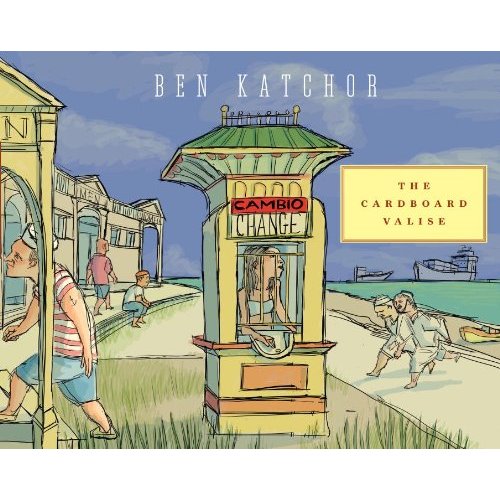Since 1988, Brooklyn-born artist Ben Katchor has been exploring urban decay and disappearing aspects of culture and society in such comic strips as Hotel & Farm, The Jew of New York, and Julius Knipl, Real Estate Photographer as well as in such musical theater pieces as The Rosenbach Company and The Slug Bearers of Kayrol Island, or, The Friends of Dr. Rushower. He focuses on old-fashioned characters who wander through cities mumbling and grumbling about the way things were, seeking out blue-plate specials and marveling at old signage from a bygone era. Katchor has just released his latest book, The Cardboard Valise (Pantheon, March 2011, $25.95), a collection of “picture-stories” published in Metropolis magazine that detail eccentric xenophile Emile Delilah’s surreal existence, including his journey to the Tensint Islands, an exotic land known for its rest-room ruins and boardwalk ice-cream licker. The book comes with fold-out carrying flaps, mimicking Emile’s valise, which is filled with an array of things, as is Katchor’s book. On April 2 at 2:00, Katchor will present A Checkroom Romance at the New School Presents Noir festival; the free musical production features text and images by Katchor and music by Mark Mulcahy. On April 9, Katchor will be signing copies of his books at the Pantheon booth at the MoCCA Festival of Comic Art at the 69th Regiment Armory at Lexington Ave. and 26th St. Katchor recently discussed travel and the future of the book in our latest twi-ny talk.

Ben Katchor’s latest collection is another genius examination of eccentricity in a surreal, old-fashioned world (photo by Jeff Goodman)
twi-ny: Your previous book, The Beauty Supply District, came out more than ten years ago. Why such a long wait?
Ben Katchor: I got involved in working on music-theater productions over the past ten years. In collaboration with composer Mark Mulcahy, we produced four shows: The Slugbearers of Kayrol Island, The Rosenbach Company, A Checkroom Romance, Memorial City, and, premiering in October 2011, Up from the Stacks. All along, I continued my weekly and monthly picture-stories but didn’t feel the need to compile them into a book — until now.
twi-ny: In The Cardboard Valise, Emile Delilah packs a heavy suitcase and heads to the Tensint Islands. You’ve also taken readers on a journey to Kayrol Island. When you go on vacation, do you prefer bustling cities, dusty towns, or exotic islands? Are there certain items that you always pack that you don’t necessarily really need, as Emile does?
BK: I like cities and the countryside of Europe. I tend to bring along piles of research material that I rarely get to use.
twi-ny: One of the major themes of your work has always involved disappearing parts of culture — outdated factories, old-fashioned signage, and people lamenting the way daily life is changing, missing how things were. With the growing success of electronic books, there are some sounding the death knell for the physical book itself. What are your thoughts on ebooks, specifically as it relates to the kind of picture-stories that you tell? Are you afraid the physical book might be a disappearing part of American culture?
BK: The repurposing of physical books for electronic distribution is an awkward and limited activity, mainly for archival purposes. The possibilities of electronic storytelling go far beyond the confines of the printed book and I look forward to seeing what develops. Physical books will be around for a long time — I see them used as window and door props, and as structures to support laptop computers. I’m used to looking at picture-stories on large high-resolution screens; modern printed books seem to me like an unfortunate reduction of the information in the original digital file. The publishing industry began to dematerialize books with the introduction of the disposable paperback — the ebook is the logical expression of this impulse.
